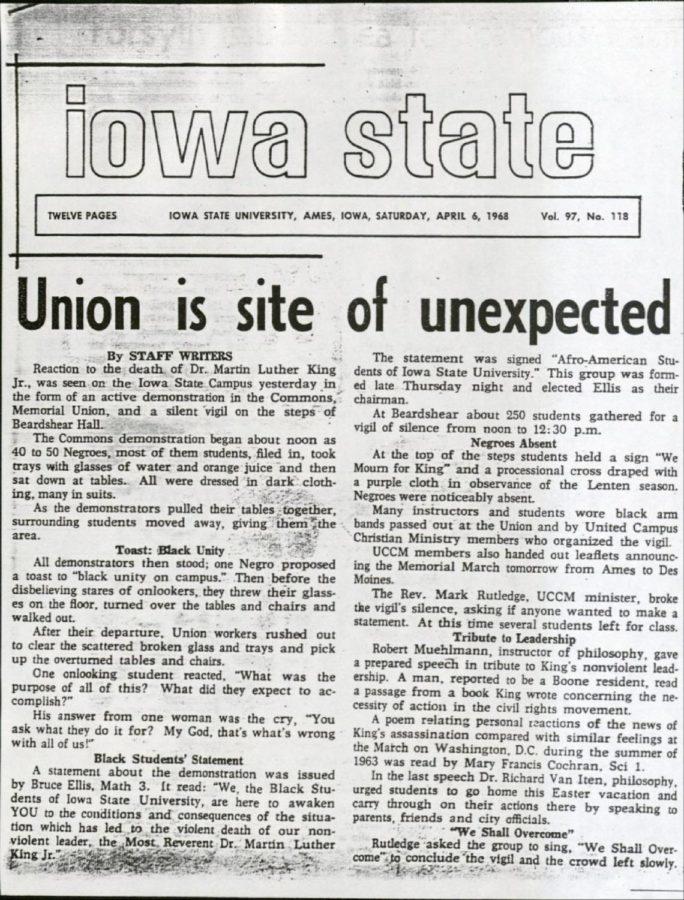50 years pass since MLK assassination, a look back at the Daily’s coverage
April 4, 2018
Fifty years ago Wednesday, shots rang out across from the Lorraine Motel in Memphis, Tennessee and civil rights movement leader Martin Luther King Jr. laid on a second story walkway of the hotel with a gunshot wound.
King would succumb to his injuries and according to New York Times obituary written by reporter Murray Schumach, many felt that his death marked the end of the civil rights movement in the United States.
Following King’s death, people in major cities across the United States began rioting in response the leader’s assassination.
According to the Iowa State Daily’s April 6, 1968 centerpiece, black students reacted to King’s death in demonstrations on campus.
The article, attributed to “staff writers,” stated that demonstrations were held in the commons at the Memorial Union and also a silent vigil on the steps of Beardshear.
Beginning at noon on April 5, 40 to 50 black students, dressed in black clothing, entered the commons with trays filled with glasses filled with water and orange juice. The students rallied their tables together, causing other students sitting in the surrounding area to leave.
Soon after, the demonstrators all stood together.
One of the black students said they were toasting to “black unity on campus.” The students finished their drinks, smashed their glasses on the floor, turned over tables and chairs, and left.
According to the article, many students stared in disbelief at the demonstration they witnessed.
“What was the purpose of all of this,” said a male student onlooker, according to the article. “What did they expect to accomplish.”
The article detailed the response from one female student.
“You asked what they do it for? My God, that’s what wrong with all of us.”
While the 40 to 50 students were in the Memorial Union, at the same time an estimated 250 students gathered at Beardshear for a silent vigil that lasted for thirty minutes.
A statement was issued about the demonstration by Bruce Ellis, a black student leader who later in the month would help establish the Black Student Organization on campus.
The statement was signed by “Afro-American Students of Iowa State University,” which was an unofficial group representing black students at Iowa State. The group was created the night King died.
Ellis, who was elected their chairman, wrote the statement.
“We, the Black students of Iowa State University, are here to awaken YOU to the conditions and consequences of the situation which has led to the violent death of our non-violent leader, the Most Reverent, Dr. Martin Luther King, Jr.,” the statement said.
Coverage from the 1968 article showed white students participating in a vigil by holding a sign saying “We Mourn For King” after having placed a processional cross draped with a purple cloth at the top of the Beardshear steps.
The vigil was organized by the United Campus Christian Ministry, which also had involvement in organizing a march from Ames to Des Moines to participate in the the Memorial March for Martin Luther King, Jr.
The organization also passed around black armbands that “many instructors and students wore” according to the article.
Another article published by the Daily on April 6 said that Denny Forsyth, the student body president at the time, issued a plea of calm.
“Unless people get actively concerned, I am afraid of what happens,” Forsyth said. “The situation is something everyone must be concerned about.”
According to the article, Forsyth was in contact with the University of Iowa and the University of Northern Iowa’s student body presidents. All three presidents discussed the opportunity of telegramming student petitions and asking for passage of a proposed civil rights bill in the United States Congress immediately.
At the time of the article, the petition Forsyth spoke of for ISU students read “Dear Iowa Congressmen, We believe that legislation for open occupancy and provision of job opportunities for all Americans must be passed this session of Congress.”
The civil rights bill that was petitioned for by students at the three Iowa universities was the 1968 Civil Rights Act, which was signed into law on April 11, 1968, during widespread rioting, by President Lyndon B. Johnson.
According to the Department of Housing and Urban Development’s website on the history of the bill’s passage, the death of King and the civil unrest that followed in the days after his death is credited for the successful passage through legislation.







